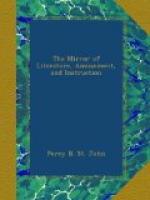“A work of great interest might be compiled upon the origin of popular fiction, and the transmission of similar tales from age to age, and from country to country. The mythology of one period would then appear to pass into the romance of the next century—and that, into the nursery tale of subsequent ages. Such an investigation, while it went greatly to diminish our ideas of the richness of human invention, would also show that these fictions, however wild and childish, possess such charms for the populace, as enable them to penetrate into countries unconnected by manners and language, and having no apparent intercourse to afford the means of transmission. It would carry me far beyond my bounds to produce instances of this community of fable, among nations who never borrowed from each other anything intrinsically worth learning. Indeed, the wide diffusion of popular fictions may be compared to the facility with which straws and feathers are dispersed abroad by the wind, while valuable metals cannot be transported without trouble and labour.”
Sir Walter, in appending this observation to a tradition extracted from “Grahame’s Sketches of Scenery in Perthshire” pp. 116-118, remarks—“that this story, translated by Dr. G. from a Gaelic tradition, is to be found in the Otia Imperialia of Gervase of Tilbury.”
Now, it is not a little singular, that of the self-same legend we have also an original edition, received from a Welsh woman, as it is current in Wales, and “believed to be true in the place where it happened”—as she averred—but whereabout in Cambria that was she failed to inform us. Here, then, is her account of a fairy favour:—
“The accoucheuse of a small village in Wales was one night aroused by a carriage driving furiously through it, and stopping at her door. A gentleman hastily alighted, entered her humble abode, and, stating that his lady required her assistance, scarcely allowed the good woman time to wrap a few garments around her, ere he hurried her into the carriage, which drove off with both of them, as if coachman and horses were mad. After the lapse of a few minutes the carriage stopped; the good woman was taken out, and ushered into a most splendid mansion—although the midnight darkness was too great to allow of her noticing its exterior and situation. After the infant was born, being about to wash and dress it, a box of some kind of ointment was put into her hands, wherewith she was desired to anoint it all over; and in doing this she happened to rub one of her eyes.—At last, her attendance being no longer required, she was re-conveyed to her own abode, in the same manner as she had been taken from it; but, although she subsequently noticed most particularly all the gentlemen’s houses in the vicinity, she was never able to discover that to which she had been taken;—neither did she ever behold the gentleman again, until many months afterwards, being at a wake in the neighbourhood, she saw, to her supreme astonishment, that mysterious stranger, liberally helping himself, without money and without leave, from the stalls!—Averse to noticing the fact, oar honest woman resolved, nevertheless, to accost him; and making her way up to where he stood, asked after the health of his lady and child, regretting that she had not been able to call and see them, since she had failed in every endeavour to find the house.




